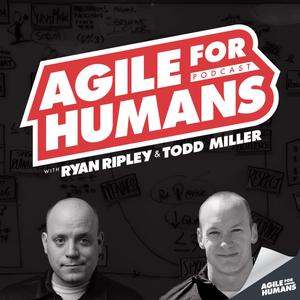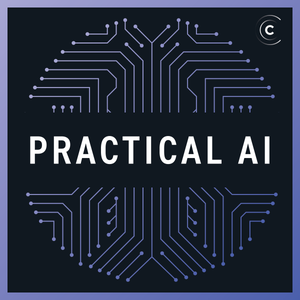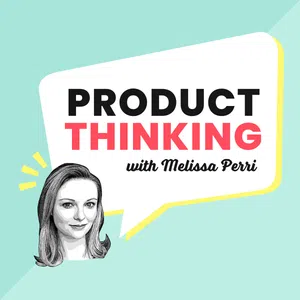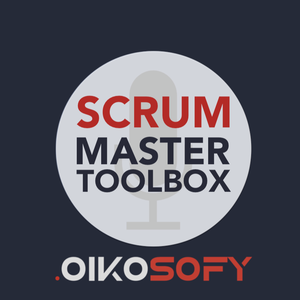
Agile for Humans with Ryan Ripley and Todd Miller
Agile for Humans, LLC
A Podcast Devoted to Agile Product Delivery
- 6 minutes 46 secondsUnlocking Business Agility with EBM - CHECK OUT OUR NEW BOOK!
📖 "Unlocking Business Agility with Evidence-Based Management: Satisfy Customers and Improve Organizational Effectiveness" on Amazon -- https://amzn.to/4690qJy
Ryan and Todd, along with Patricia Kong and Kurt Bidner, released a new book, "Unlocking Business Agility with Evidence-Based Management" (EBM), on October 31st. This book encapsulates over 10 years of their combined experience in EBM.
The book, which spans eight chapters and is 166 pages long, covers EBM at various levels, including portfolio, project, and organizational levels. It aims to provide new theories and novel ideas about what EBM can offer organizations.
The authors expressed their enthusiasm for the book's physical publication and discussed how it incorporates numerous real-life stories and experiences. They aim to clarify misconceptions about EBM and further its application in the business world.
Ryan and Todd reflected on the unique aspects of writing this book compared to their previous work, "Fixing Your Scrum." They highlighted that "Unlocking Business Agility with EBM" offers fresh insights and elaborations on EBM rather than following an established path.
The book is available in both eBook and paperback formats. The authors encourage readers to check it out, leave reviews, and share their thoughts. They also invite discussions and questions about EBM, intending to continue creating content and engaging with the community.
🔗 Join Ryan & Todd's Scrum.org course: https://buytickets.at/agileforhumansllc
Explore more:
📖 "Unlocking Business Agility with Evidence-Based Management: Satisfy Customers and Improve Organizational Effectiveness" on Amazon -- https://amzn.to/4690qJy
📖 "Fixing Your Scrum: Practical Solutions to Common Scrum Problems" on Amazon -- https://amzn.to/46dAQTC
✅ Subscribe to this channel for Agile, Scrum, and Kanban insights: https://www.youtube.com/agileforhumans?sub_confirmation=1
- 🌐 Connect with Agile for Humans:
- 📘 Website - https://agileforhumans.com/
- 🐦 Twitter - https://twitter.com/agileforhumans
- 🔗 LinkedIn - https://www.linkedin.com/company/agile-for-humans-llc
- 🔍 The Evidence-Based Company - https://theevidencebasedcompany.com/
- 📧 Email - [email protected]
Learn more about your ad choices. Visit megaphone.fm/adchoices
17 May 2024, 9:10 am - 11 minutes 15 secondsScrum is Hard and Disruptive 15 - Leadership is Essential
Ryan and Todd look back at a 2006 post by Ken Schwaber, which covers 15 ways Scrum is both hard and disruptive.
The fifteenth statement from Ken:
"The role of enterprise management changes from telling people what to do to leading and helping everyone do their best to achieve goals. People aren’t resources, and managers aren’t bosses."
Leadership Transition: In a Scrum environment, the role of enterprise management shifts from directive ("telling people what to do") to supportive, focusing on leading and helping team members achieve their best in reaching goals. This change emphasizes the importance of management's role in guiding and enabling rather than controlling.
Goal Setting and Constraints: Setting strategic and specific goals is crucial in Scrum. These goals act as constraints that guide teams. Practical goal setting aligns with the overall company strategy and should be outcome-oriented. Management's role includes facilitating setting these goals and ensuring they align with broader company objectives.
Redefining Productivity: Traditional productivity measures, such as presence at a desk or busyness, are seen as inadequate. Instead, the focus should be on the outcomes and impact on the customer. It's essential to shift from output (quantity of work done) to outcome (effectiveness and relevance of the work).
People Over Resources: There is a significant mindset shift from treating people as resources to be exploited to valuing them as team members with the potential to contribute meaningfully. This involves moving away from micromanagement towards empowering self-managing teams, emphasizing skills development, and creating an environment conducive to productivity and creativity.
Evidence-Based Management: Emphasizes using objective measures to assess progress towards goals and identify issues. It involves setting up boundaries and constraints, assisting in goal formulation, and removing obstacles that hinder team effectiveness. Managers are encouraged to partner with teams, aiding in eliminating impediments and focusing on long-term sustainable success rather than short-term outputs.
👉 Follow our journey through all 15 insights in Ken Schwaber's white paper, revealing the enduring relevance of Scrum principles.
💬 Share your perspectives in the comments and remember to like and subscribe for more in-depth Scrum discussions. 🔔
🔗 Here is the original white paper: https://www.verheulconsultants.nl/ScrumIsHardandDisruptive.pdf
🔗 Join Ryan & Todd's Scrum.org course: https://buytickets.at/agileforhumansllc
Explore more:
📖 "Unlocking Business Agility with Evidence-Based Management: Satisfy Customers and Improve Organizational Effectiveness" on Amazon -- https://amzn.to/4690qJy
📖 "Fixing Your Scrum: Practical Solutions to Common Scrum Problems" on Amazon -- https://amzn.to/46dAQTC
✅ Subscribe to this channel for Agile, Scrum, and Kanban insights: https://www.youtube.com/agileforhumans?sub_confirmation=1
- 🌐 Connect with Agile for Humans:
- 📘 Website - https://agileforhumans.com/
- 🐦 Twitter - https://twitter.com/agileforhumans
- 🔗 LinkedIn - https://www.linkedin.com/company/agile-for-humans-llc
- 🔍 The Evidence-Based Company - https://theevidencebasedcompany.com/
- 📧 Email - [email protected]
Learn more about your ad choices. Visit megaphone.fm/adchoices
14 May 2024, 8:10 am - 21 minutes 45 secondsEsther Derby's Journey to Scrum Mastery | Expert Insights & Tips
Welcome to another exciting episode of "Becoming a Scrum Master"! In this episode, host Ryan Ripley is joined by the renowned Esther Derby, a pivotal figure in the agile community and author of "Seven Rules for Positive, Productive Change" and the upcoming second edition of "Agile Retrospectives". Join us as Esther shares her rich journey in the world of Scrum and Agile methodologies.
🔗 Join Ryan & Todd's Scrum.org course: https://buytickets.at/agileforhumansllc
Explore more:
📖 "Unlocking Business Agility with Evidence-Based Management: Satisfy Customers and Improve Organizational Effectiveness" on Amazon -- https://amzn.to/4690qJy
📖 "Fixing Your Scrum: Practical Solutions to Common Scrum Problems" on Amazon -- https://amzn.to/46dAQTC
✅ Subscribe to this channel for Agile, Scrum, and Kanban insights: https://www.youtube.com/agileforhumans?sub_confirmation=1
- 🌐 Connect with Agile for Humans:
- 📘 Website - https://agileforhumans.com/
- 🐦 Twitter - https://twitter.com/agileforhumans
- 🔗 LinkedIn - https://www.linkedin.com/company/agile-for-humans-llc
- 🔍 The Evidence-Based Company - https://theevidencebasedcompany.com/
- 📧 Email - [email protected]
Learn more about your ad choices. Visit megaphone.fm/adchoices
13 May 2024, 4:00 am - 13 minutes 12 secondsSouleymane Thiongane's Journey to Scrum Mastery | Expert Insights & Tips
Welcome to a new enlightening episode of "Becoming a Scrum Master"! In this episode, we're excited to feature Souleymane Thiongane, a remarkable figure in the Scrum community, as he joins host Ryan Ripley for an engaging conversation about his journey with Scrum. From his initial discovery of Scrum as a software developer to becoming a passionate advocate and master of the Scrum framework, Souleymane shares valuable lessons and experiences.
🔗 Join Ryan & Todd's Scrum.org course: https://buytickets.at/agileforhumansllc
Explore more:
📖 "Unlocking Business Agility with Evidence-Based Management: Satisfy Customers and Improve Organizational Effectiveness" on Amazon -- https://amzn.to/4690qJy
📖 "Fixing Your Scrum: Practical Solutions to Common Scrum Problems" on Amazon -- https://amzn.to/46dAQTC
✅ Subscribe to this channel for Agile, Scrum, and Kanban insights: https://www.youtube.com/agileforhumans?sub_confirmation=1
- 🌐 Connect with Agile for Humans:
- 📘 Website - https://agileforhumans.com/
- 🐦 Twitter - https://twitter.com/agileforhumans
- 🔗 LinkedIn - https://www.linkedin.com/company/agile-for-humans-llc
- 🔍 The Evidence-Based Company - https://theevidencebasedcompany.com/
- 📧 Email - [email protected]
Learn more about your ad choices. Visit megaphone.fm/adchoices
10 May 2024, 7:20 am - 13 minutes 45 secondsJowen Mei's Journey to Scrum Mastery | Expert Insights & Tips
Jowen Mei's scrum journey began in 2010 as a C# developer in Microsoft technology. His first experience with Scrum was transformative, sparking his love for the framework due to its focus on autonomy, mastery, and purpose, such as team collaboration, TDD, and direct customer engagement.
After his initial scrum experience, Mei launched his own agile-focused startup, which faced initial challenges. He returned to consultancy, gradually shifting from development to scrum mastering, influenced by the role's complexity and its impact on professional and personal life.
Mei's early scrum master approach focused on strict adherence to practices and persuasion, but he evolved to emphasize coaching, inspiration, and empowering team ownership for sustainable improvement.
For aspiring scrum masters, Mei emphasizes the importance of curiosity, humility, and an experimental mindset. He believes in understanding underlying reasons for team behaviors and adopting a continuous improvement mindset.
Mei recommends Christopher Avery's book The Responsibility Process for scrum masters. He values its insights into the psychological aspects of ownership and responsibility and shares his appreciation for the book's impact on his understanding of team dynamics and leadership.
🔗 Join Ryan & Todd's Scrum.org course: https://buytickets.at/agileforhumansllc
Explore more:
📖 "Unlocking Business Agility with Evidence-Based Management: Satisfy Customers and Improve Organizational Effectiveness" on Amazon -- https://amzn.to/4690qJy
📖 "Fixing Your Scrum: Practical Solutions to Common Scrum Problems" on Amazon -- https://amzn.to/46dAQTC
✅ Subscribe to this channel for Agile, Scrum, and Kanban insights: https://www.youtube.com/agileforhumans?sub_confirmation=1
- 🌐 Connect with Agile for Humans:
- 📘 Website - https://agileforhumans.com/
- 🐦 Twitter - https://twitter.com/agileforhumans
- 🔗 LinkedIn - https://www.linkedin.com/company/agile-for-humans-llc
- 🔍 The Evidence-Based Company - https://theevidencebasedcompany.com/
- 📧 Email - [email protected]
Learn more about your ad choices. Visit megaphone.fm/adchoices
9 May 2024, 7:10 am - 18 minutes 57 secondsPawel Mysliwiec's Journey to Scrum Mastery | Expert Insights & Tips
Pawel Mysliwiec, a fellow professional Scrum trainer with Scrum.org, joins host Ryan Ripley on the "Becoming a Scrum Master" podcast.
Pawel's Entry into Scrum: Pawel recounts his initial, unknowing encounter with Scrum while working as a product manager on bank credit transaction software. He participated in what he later learned were Scrum meetings, such as the daily Scrum, without realizing it was part of Scrum methodology.
Eureka Moment in Scrum: Pawel experienced his transformative moment with Scrum on a complex project within a waterfall program. He managed two teams and decided to apply Scrum internally while maintaining a project manager facade externally. This led to successful incremental deliveries and effective collaboration between business and IT personnel, which was a revelation to him.
Evolution of Scrum Master Role: Pawel reflects on the evolution of the Scrum Master role, emphasizing the shift from understanding and practicing Scrum to ensuring the team's long-term success and delivering financial value. He believes the role encompasses facilitating team effectiveness and reliability and helping teams become examples of good practice.
Advice for Aspiring Scrum Masters: Pawel advises patience and resilience as key traits for Scrum Masters. Change doesn't happen overnight, and a good Scrum Master should be resilient enough to keep trying while being patient for the change to occur. He also suggests a learning-by-doing approach and recommends reading books on Scrum Mastery, particularly for beginners.
🔗 Join Ryan & Todd's Scrum.org course: https://buytickets.at/agileforhumansllc
Explore more:
📖 "Unlocking Business Agility with Evidence-Based Management: Satisfy Customers and Improve Organizational Effectiveness" on Amazon -- https://amzn.to/4690qJy
📖 "Fixing Your Scrum: Practical Solutions to Common Scrum Problems" on Amazon -- https://amzn.to/46dAQTC
✅ Subscribe to this channel for Agile, Scrum, and Kanban insights: https://www.youtube.com/agileforhumans?sub_confirmation=1
- 🌐 Connect with Agile for Humans:
- 📘 Website - https://agileforhumans.com/
- 🐦 Twitter - https://twitter.com/agileforhumans
- 🔗 LinkedIn - https://www.linkedin.com/company/agile-for-humans-llc
- 🔍 The Evidence-Based Company - https://theevidencebasedcompany.com/
- 📧 Email - [email protected]
Learn more about your ad choices. Visit megaphone.fm/adchoices
8 May 2024, 8:20 am - 8 minutes 56 secondsScrum is Hard and Disruptive 14 - Conflict Not Fights
Ryan and Todd look back at a 2006 post by Ken Schwaber, which covers 15 ways Scrum is both hard and disruptive.
The fourteenth statement from Ken:
"A team consists of people under pressure to do their best. Conflict is natural and the team needs to know how to deal with the conflict and have resources to draw on when needed."
Natural Conflict in Teams: The episode discusses how conflict is a natural occurrence in teams, especially under pressure. This pressure can be constructive and lead to better performance if it's oriented towards clear goals, such as achieving Sprint and product goals in Scrum.
Healthy vs. Unhealthy Conflict: They emphasize the difference between healthy and unhealthy conflict. Healthy conflict focuses on problem-solving and can be beneficial, while unhealthy conflict, which can escalate to personal fights, is detrimental. The key is to maintain focus on solving problems, not winning arguments.
Role of Scrum Values in Managing Conflict: Scrum values like commitment are highlighted in managing conflict. These values support positive, natural conflict oriented towards team goals and problem-solving instead of destructive fights.
Team Dynamics and Conflict Resolution: The hosts discuss the importance of recognizing when a discussion is veering away from productive conflict and turning into a personal fight. They stress the importance of team members being able to intervene, reset the focus on the problem, and avoid stubbornness in pursuit of being right.
Balance Between Agreement and Conflict: They conclude that while conflict is necessary for progress, it needs to be balanced. Neither constant agreement nor continuous fighting is beneficial. A good Scrum Master, product owner, or team member should help maintain this balance, encouraging healthy conflict while preventing fights.
👉 Follow our journey through all 15 insights in Ken Schwaber's white paper, revealing the enduring relevance of Scrum principles.
💬 Share your perspectives in the comments and remember to like and subscribe for more in-depth Scrum discussions. 🔔
🔗 Here is the original white paper: https://www.verheulconsultants.nl/ScrumIsHardandDisruptive.pdf
🔗 Join Ryan & Todd's Scrum.org course: https://buytickets.at/agileforhumansllc
Explore more:
📖 "Unlocking Business Agility with Evidence-Based Management: Satisfy Customers and Improve Organizational Effectiveness" on Amazon -- https://amzn.to/4690qJy
📖 "Fixing Your Scrum: Practical Solutions to Common Scrum Problems" on Amazon -- https://amzn.to/46dAQTC
✅ Subscribe to this channel for Agile, Scrum, and Kanban insights: https://www.youtube.com/agileforhumans?sub_confirmation=1
- 🌐 Connect with Agile for Humans:
- 📘 Website - https://agileforhumans.com/
- 🐦 Twitter - https://twitter.com/agileforhumans
- 🔗 LinkedIn - https://www.linkedin.com/company/agile-for-humans-llc
- 🔍 The Evidence-Based Company - https://theevidencebasedcompany.com/
- 📧 Email - [email protected]
Learn more about your ad choices. Visit megaphone.fm/adchoices
7 May 2024, 7:10 am - 17 minutes 2 secondsMagdalena Firlit's Journey to Scrum Mastery | Expert Insights & Tips
Magdalena discusses her transition from traditional project management to Scrum. In 2008, while experiencing project delays and rapid business environment changes, she discovered Scrum in a project management course, finding it a revelation for addressing these challenges.
Firlit highlights a pivotal moment in her journey: recognizing Scrum's ability to respond to market changes and customer needs, previously overlooked in traditional project management approaches. This realization initiated discussions about adopting new methodologies within her organization.
Her Scrum Master journey involved a professional transformation and a shift in personal mindset and habits. After a few years in various roles related to agile coaching and product management, she found passion and happiness in these new methodologies.
Firlit emphasizes the evolving role of a Scrum Master, stressing the importance of focusing on organizational aspects and value orientation rather than just team-level concerns and basic practices. She discusses challenges in organizational culture and the need for openness to change.
Lastly, she advises aspiring Scrum Masters to focus on the broader organizational context and product ownership, emphasizing the need to understand and respond to complexity, market changes, and technology advancements. She recommends thinking beyond team effectiveness and tool usage to include organizational agility and product outcomes.
🔗 Join Ryan & Todd's Scrum.org course: https://buytickets.at/agileforhumansllc
Explore more:
📖 "Unlocking Business Agility with Evidence-Based Management: Satisfy Customers and Improve Organizational Effectiveness" on Amazon -- https://amzn.to/4690qJy
📖 "Fixing Your Scrum: Practical Solutions to Common Scrum Problems" on Amazon -- https://amzn.to/46dAQTC
✅ Subscribe to this channel for Agile, Scrum, and Kanban insights: https://www.youtube.com/agileforhumans?sub_confirmation=1
- 🌐 Connect with Agile for Humans:
- 📘 Website - https://agileforhumans.com/
- 🐦 Twitter - https://twitter.com/agileforhumans
- 🔗 LinkedIn - https://www.linkedin.com/company/agile-for-humans-llc
- 🔍 The Evidence-Based Company - https://theevidencebasedcompany.com/
- 📧 Email - [email protected]
Learn more about your ad choices. Visit megaphone.fm/adchoices
6 May 2024, 7:40 am - 18 minutes 3 secondsDavid Sabine's Journey to Scrum Mastery | Expert Insights & Tips
David shares his first exposure to Scrum in 2007 during a two-day training seminar organized by his then-employer. This led him and his colleagues to experiment with Scrum in their workplace, with David volunteering to be the Scrum Master.
Application and Evolution of Scrum Mastery: David discusses applying Scrum principles both in an academic setting and later as a product owner in a Toronto startup. He reflects on the evolution of his understanding of the Scrum Master role, emphasizing its complexity and the importance of having positional authority and experience in technology and business domains.
Insights on the Scrum Master Role: The conversation delves into the changing perceptions of the Scrum Master role, with both agreeing it's not an entry-level position but one requiring experience and authority. They note a trend where the role has been misunderstood and diminished, advocating for a return to viewing it as a leadership position.
Advice for Aspiring Scrum Masters and Resources: David advises new Scrum Masters to understand the agreements within their teams, focus on the concept of 'Definition of Done,' and foster relationships beyond work.
He recommends the book The Wisdom of Teams and shares his involvement in training and consulting and his book about the Phoenix payroll system failure in Canada's federal government.
🔗 Join Ryan & Todd's Scrum.org course: https://buytickets.at/agileforhumansllc
Explore more:
📖 "Unlocking Business Agility with Evidence-Based Management: Satisfy Customers and Improve Organizational Effectiveness" on Amazon -- https://amzn.to/4690qJy
📖 "Fixing Your Scrum: Practical Solutions to Common Scrum Problems" on Amazon -- https://amzn.to/46dAQTC
✅ Subscribe to this channel for Agile, Scrum, and Kanban insights: https://www.youtube.com/agileforhumans?sub_confirmation=1
- 🌐 Connect with Agile for Humans:
- 📘 Website - https://agileforhumans.com/
- 🐦 Twitter - https://twitter.com/agileforhumans
- 🔗 LinkedIn - https://www.linkedin.com/company/agile-for-humans-llc
- 🔍 The Evidence-Based Company - https://theevidencebasedcompany.com/
- 📧 Email - [email protected]
Learn more about your ad choices. Visit megaphone.fm/adchoices
3 May 2024, 7:40 am - 5 minutes 36 secondsScrum Myth or Fact #1 - The Scrum Master is responsible for the personal growth of the developers
The video is part of a series in which hosts Todd Miller, and Ryan Ripley discuss common myths or facts about Scrum, encouraging viewers to participate by commenting on their opinions before watching the response.
🔍 Today's Myth or Fact: "The Scrum Master is responsible for the personal growth of the developers."
Todd and Ryan agree that the statement is a myth, emphasizing that personal growth and development are individual responsibilities, not the Scrum Master's.
🔗 Join Ryan & Todd's Scrum.org course: https://buytickets.at/agileforhumansllc
Explore more:
📖 "Unlocking Business Agility with Evidence-Based Management: Satisfy Customers and Improve Organizational Effectiveness" on Amazon -- https://amzn.to/4690qJy
📖 "Fixing Your Scrum: Practical Solutions to Common Scrum Problems" on Amazon -- https://amzn.to/46dAQTC
✅ Subscribe to this channel for Agile, Scrum, and Kanban insights: https://www.youtube.com/agileforhumans?sub_confirmation=1
- 🌐 Connect with Agile for Humans:
- 📘 Website - https://agileforhumans.com/
- 🐦 Twitter - https://twitter.com/agileforhumans
- 🔗 LinkedIn - https://www.linkedin.com/company/agile-for-humans-llc
- 🔍 The Evidence-Based Company - https://theevidencebasedcompany.com/
- 📧 Email - [email protected]
Learn more about your ad choices. Visit megaphone.fm/adchoices
2 May 2024, 8:40 am - 15 minutes 8 secondsLavaneesh Gautam's Journey to Scrum Mastery | Expert Insights & Tips
Lavaneesh Gautam, a professional scrum trainer, shares his journey to becoming a Scrum Master on the "Becoming a Scrum Master" podcast with host Ryan Ripley.
Gautam first encountered Scrum while working as a developer/business analyst in a fintech company in 2011. He appreciated its transparency and visual management, which motivated him to become a Scrum Master in 2014.
His interest in Scrum was sparked by the limitations he observed in the waterfall method, particularly its command-and-control culture, which diminished job satisfaction.
Gautam highlights a pivotal experience in an automotive company where a project failure due to a lack of agile methodology made him realize the importance of iterative and incremental work and understanding the underlying needs behind requirements.
He advises aspiring Scrum Masters to continually learn and explore beyond formal training, emphasizing the importance of mindset, experimentation, and understanding broader aspects of product management and team dynamics.
🔔 Stay tuned for more episodes filled with expert knowledge and intriguing discussions. We encourage you to share your thoughts and questions in the comments below. Your input is valuable to our community, and we often feature your inquiries in our future videos!
👍 Found this episode enlightening? Please LIKE and SHARE it with your network to spread the knowledge!
🔗 Join Ryan & Todd's Scrum.org course: https://buytickets.at/agileforhumansllc
Explore more:
📖 "Unlocking Business Agility with Evidence-Based Management: Satisfy Customers and Improve Organizational Effectiveness" on Amazon -- https://amzn.to/4690qJy
📖 "Fixing Your Scrum: Practical Solutions to Common Scrum Problems" on Amazon -- https://amzn.to/46dAQTC
✅ Subscribe to this channel for Agile, Scrum, and Kanban insights: https://www.youtube.com/agileforhumans?sub_confirmation=1
- 🌐 Connect with Agile for Humans:
- 📘 Website - https://agileforhumans.com/
- 🐦 Twitter - https://twitter.com/agileforhumans
- 🔗 LinkedIn - https://www.linkedin.com/company/agile-for-humans-llc
- 🔍 The Evidence-Based Company - https://theevidencebasedcompany.com/
- 📧 Email - [email protected]
Learn more about your ad choices. Visit megaphone.fm/adchoices
1 May 2024, 6:40 am - More Episodes? Get the App
Your feedback is valuable to us. Should you encounter any bugs, glitches, lack of functionality or other problems, please email us on [email protected] or join Moon.FM Telegram Group where you can talk directly to the dev team who are happy to answer any queries.
 AWS Podcast
AWS Podcast
 Projectified
Projectified
 Practical AI: Machine Learning, Data Science, LLM
Practical AI: Machine Learning, Data Science, LLM
 Agile Coaches' Corner
Agile Coaches' Corner
 Product Thinking
Product Thinking
 Scrum Master Toolbox Podcast: Agile storytelling from the trenches
Scrum Master Toolbox Podcast: Agile storytelling from the trenches